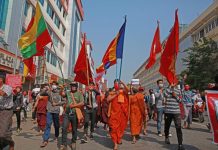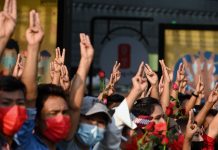
Democracy activists' books disappear from Hong Kong libraries. They have become unavailable after review shows they violate the new national security law.
The new national security legislation criminalizes subversion, secession, terrorism and collusion with foreign forces. Those who will be found guilty can be imprisoned for life.
The Leisure and Cultural Services Department announced that Hong Kong public libraries “will review whether certain books violate the stipulations of the National Security Law."
“While legal advice will be sought in the process of the review, the books will not be available for borrowing and reference in libraries.”
The books written by activist Joshua Wong and pro-democracy politician Tanya Chan on the public libraries, including “Unfree Speech” which is co-authored by Wong, are either unavailable or under review on the public libraries website.
“The national security law ... imposes a mainland-style censorship regime upon this international financial city,” Wong tweeted on Saturday. He said that his titles “are now prone to book censorship.”
Pro-democracy activists, lawyers, and foreign governments criticized the national-security legislation because it is seen as a weapon to restrain dissent and compromise liberties the former British colony started enjoying when it returned to Chinese rule in 1997.
The Hong Kong Bar Association said that the national security law wrecks the legal firewall established between Hong Kong’s independent judiciary and China’s Communist Party-controlled courts since the 1997 handover.
Based on their five-page analysis, the association said that the new national security law’s offenses were “widely drawn” and “are capable of being applied in a manner that is arbitrary, and that disproportionately interferes with fundamental rights, including the freedom of conscience, expression and assembly.”
The number of books that are under review is not certain. Two titles by Chinese Nobel Peace Prize-winning political dissident Liu Xiaobo remain available, according to the online search.
Criticisms against the law
Aside from activitists, several global leaders reacted to signing of the national security law. US Secretary of State Mike Pompeo said that “China is modelling Hong Kong after itself.”
Pompeo previously told Congress that Hong Kong was no longer autonomous from China. The approval of the national security law for Hong Kong could damage the trade relationship of Hong Kong with the US.
“No reasonable person can assert today that Hong Kong maintains a high degree of autonomy from China, given facts on the ground,” Pompeo said in a statement.
In a joint statement, the US, UK, Australia, and Canada said they have “deep concern” regarding the national security law imposed on Hong Kong.
“Hong Kong has flourished as a bastion of freedom. The international community has a significant and long-standing stake in Hong Kong’s prosperity and stability,” it said.
“Direct imposition of national security legislation on Hong Kong by the Beijing authorities, rather than through Hong Kong’s own institutions as provided for under Article 23 of the Basic Law, would curtail the Hong Kong people’s liberties.”
The approval of the national security law will “dramatically erode Hong Kong’s autonomy and the system that made it so prosperous,” they noted.
According to the joint statement, the law “will exacerbate the existing deep divisions in Hong Kong society” and “does nothing to build mutual understanding and foster reconciliation within Hong Kong.”






